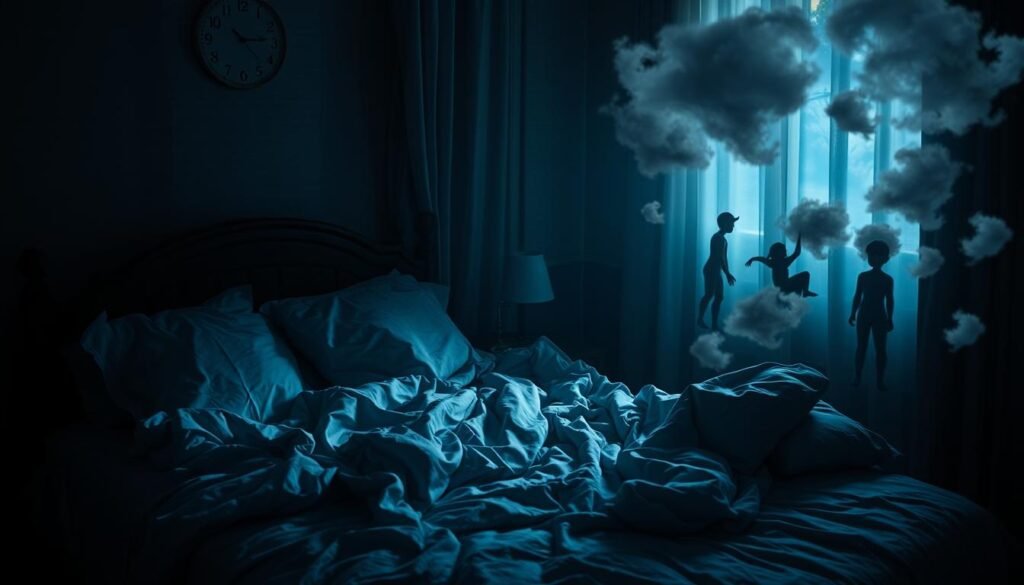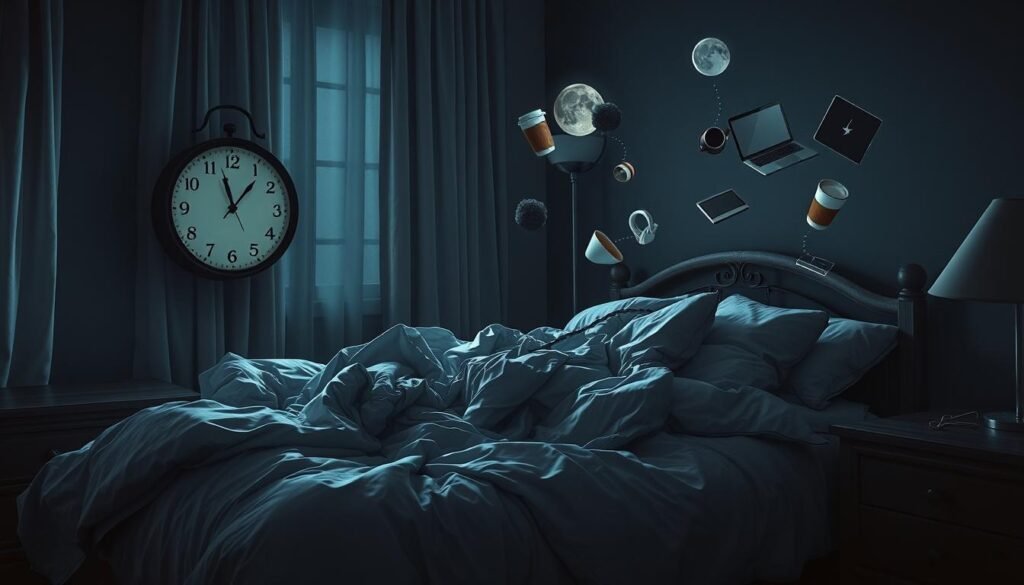Sleep disorders like insomnia affect millions of Americans every night. It’s key to understand insomnia to get restful nights and stay healthy. Sleeplessness can really mess up your day, affecting your mind and body.
Insomnia isn’t just about not falling asleep. It’s about many sleep issues, like starting to sleep hard or waking up a lot. These problems can come from stress, how you live, or health issues.
Knowing the signs of sleeplessness is the first step to finding help. This guide will dive into insomnia’s complexities. It will give you practical tips to sleep better and live a better life.
Key Takeaways
- Insomnia affects millions of people worldwide
- Sleep disorders can significantly impact daily performance
- Multiple factors contribute to sleeplessness
- Understanding your sleep patterns is essential for treatment
- Effective strategies exist for managing sleep challenges
What Is Insomnia and Why It Affects Your Health
Insomnia is more than just trouble falling asleep. It messes with the natural sleep cycle, causing big problems for those who can’t sleep well. Knowing about insomnia helps us see how it affects our health and happiness.

Types of Insomnia: Acute vs. Chronic
Sleep experts say there are two main types of insomnia:
- Acute Insomnia: This is short-term sleep trouble that lasts a few days or weeks. It’s often caused by stress or big changes in life.
- Chronic Insomnia: This is long-term sleep trouble that happens at least three nights a week for three months or more.
Physical and Mental Health Implications
“Sleep is the golden chain that binds health and our bodies together.” – Thomas Dekker
Not getting enough sleep can really hurt you. Chronic insomnia puts a lot of strain on your body, including:
- Weakened immune function
- Increased risk of heart problems
- Elevated stress hormone levels
- Impaired brain function
Recognizing Sleep Pattern Disruptions
To spot insomnia, watch your sleep patterns closely. Look out for trouble falling asleep, waking up a lot at night, and feeling tired even after sleeping enough.
Common Causes Behind Sleepless Nights

Understanding why we can’t sleep is key to solving the problem. Many things can mess with our sleep patterns. This leads to ongoing sleep issues.
Stress is a big reason for insomnia. Work, relationships, and personal problems can keep our minds racing. This makes it hard to relax and sleep well.
- Psychological factors like anxiety and depression
- Chronic medical conditions
- Hormonal imbalances
- Medications with sleep-disrupting side effects
Our lifestyle choices also affect our sleep. Irregular sleep times, too much caffeine, and screens before bed hurt our sleep.
“Sleep is the golden chain that binds health and our bodies together” – Thomas Dekker
Things like noise, light, and uncomfortable temperatures can also disturb sleep. Making our sleep space better is important for good sleep.
Knowing what might be causing our sleep problems is the first step. Then, we can find ways to improve our sleep and beat sleeplessness.
Understanding Insomnia’s Impact on Daily Life
Sleep deprivation can make everyday life tough. It affects both personal and work life deeply.
Work Performance and Productivity
Not getting enough sleep hurts work performance a lot. People who don’t sleep well often struggle with:
- Decreased concentration and mental clarity
- Slower cognitive processing speeds
- Higher rates of professional errors
- Reduced problem-solving capabilities
“Sleep is the golden chain that binds health and our bodies together.” – Thomas Dekker
Social Relationships and Mood Changes
Insomnia can also harm personal relationships. Persistent sleep challenges lead to mood swings, including:
- Increased irritability
- Higher susceptibility to stress
- Potential depression symptoms
- Reduced emotional resilience
Long-term Health Consequences
Ignoring sleep problems can lead to serious health issues. Long-term effects include:
- Weakened immune system
- Increased heart disease risk
- Potential weight management challenges
- Neurological function deterioration
The Science of Sleep Cycles and Circadian Rhythms
Sleep is a complex process controlled by our body’s internal clock. This clock tells us when to be awake and when to sleep. It’s key to managing sleep disorders and keeping us healthy.
Our bodies have a 24-hour cycle that matches the day and night. This cycle affects many things:
- Hormone production
- Body temperature regulation
- Sleep-wake patterns
- Metabolic processes
A master clock in the brain’s hypothalamus controls our rhythms. Light tells this clock to keep us awake. Darkness makes our body release melatonin, helping us sleep.
“Your body’s internal clock is like a sophisticated conductor, orchestrating the complex symphony of sleep and wakefulness.” – Sleep Research Institute
Disruptions can cause sleep disorders. Irregular work, jet lag, and too much screen time can upset our balance. This can lead to insomnia and other health issues.
Knowing how our body works helps us manage sleep better. It also helps us tackle sleep disorders more effectively.
Medical Conditions That Trigger Insomnia
Sleep disorders can come from many medical conditions. These conditions mess with our sleep patterns. It’s important to know these health issues to manage insomnia well.
Physical Health Conditions
Many physical health problems can hurt our sleep. Some main ones include:
- Chronic pain syndromes
- Respiratory disorders like sleep apnea
- Neurological conditions
- Gastrointestinal diseases
“Pain and discomfort can create a vicious cycle of interrupted sleep and increased medical symptoms.”
Mental Health Disorders
Mental health is key in sleep disorders. Conditions like depression, anxiety, and PTSD can mess with our sleep. This makes it hard to get a good night’s rest.
- Depression
- Generalized anxiety disorder
- Bipolar disorder
- Post-traumatic stress syndrome
Hormonal Imbalances
Hormonal changes can affect our sleep. Perimenopause, thyroid disorders, and cortisol irregularities often lead to insomnia. This causes big sleep problems.
- Menopausal transitions
- Thyroid dysfunction
- Cortisol level fluctuations
- Reproductive hormone changes
Natural Remedies and Lifestyle Changes
Insomnia doesn’t always need medicine. Natural remedies can help a lot. Making lifestyle changes can also improve sleep a lot.
Diet is key for sleep. Some foods help, while others hurt:
- Avoid caffeine after 2 PM
- Limit alcohol consumption
- Eat magnesium-rich foods like almonds and spinach
- Drink herbal teas such as chamomile
“Sleep is the golden chain that binds health and our bodies together.” – Thomas Dekker
Exercise is also great for sleep. It helps set your body clock right and lowers stress. Aim for 30 minutes of moderate exercise most days, but not before bed.
Relaxation techniques can also help a lot. Try:
- Meditation
- Deep breathing exercises
- Progressive muscle relaxation
- Gentle yoga stretches
Herbal supplements like valerian root and lavender can also help. But talk to a doctor before taking them.
Learn More!
Prescription Medications and Treatment Options
Finding the right treatment for insomnia can be tough. For many, prescription meds are a good option when other methods don’t work. It’s key to know how to use sleep meds effectively.
Sleep Medication Types
Doctors often give out different types of sleep meds for insomnia:
- Benzodiazepines: Traditional sedatives for short-term use
- Non-benzodiazepine hypnotics: Newer meds with fewer side effects
- Melatonin receptor agonists: Help regulate sleep-wake cycles
- Antidepressants: Sometimes used for sleep disorders with mental health issues
Potential Side Effects
While sleep meds can help, there are risks to watch out for. Common side effects include:
- Daytime drowsiness
- Dizziness
- Potential dependency
- Cognitive impairment
“Always consult with a healthcare professional before starting any sleep medication.” – Sleep Specialists Association
When to Consider Medication
Prescription sleep meds might be right when:
- Non-pharmaceutical methods don’t work
- Sleep disorders really affect daily life
- Medical conditions also cause insomnia
- Short-term relief is needed during stressful times
Getting advice from a doctor is crucial in finding the best treatment for insomnia.
Creating an Effective Sleep Hygiene Routine
Understanding insomnia starts with a good sleep hygiene routine. Your nightly habits are key to better sleep. A well-made sleep routine can make your nights calm and restful.
Sleep hygiene is about practices that get your body and mind ready for sleep. These habits help you sleep better and wake up feeling refreshed.
- Maintain a consistent sleep schedule
- Create a relaxing bedtime ritual
- Design a comfortable sleep environment
- Limit screen time before bed
- Manage daytime activities that impact sleep
Key elements of an effective sleep hygiene routine include:
- Bedroom Environment: Make your bedroom cool, dark, and quiet. Use comfy bedding and avoid things that might wake you up.
- Evening Preparation: Have a calming routine before bed like reading, stretching, or meditation.
- Digital Detox: Stay away from screens at least 60 minutes before bed to avoid blue light.
“Good sleep is not a luxury—it’s a biological necessity.” – Sleep Experts
Adding these sleep hygiene practices to your life can greatly improve your sleep. Small, steady changes can help fight insomnia and lead to better nights.
Cognitive Behavioral Therapy for Insomnia (CBT-I)
Do you struggle with sleep problems that won’t go away? Cognitive behavioral therapy for insomnia (CBT-I) is a powerful, drug-free way to take back your nights. It focuses on the main reasons for sleep issues, giving you tools to beat insomnia.
CBT-I treats insomnia differently than usual methods. It looks at how thoughts, actions, and sleep patterns are linked. This method helps you find lasting ways to sleep better, unlike medicines that only treat symptoms.
Core Components of CBT-I
- Sleep restriction techniques
- Stimulus control therapy
- Cognitive restructuring
- Relaxation and stress management training
- Sleep hygiene education
What Patients Can Expect
Patients usually see a therapist for 6-8 weekly sessions. The therapy includes:
- Spotting negative sleep thoughts
- Learning to handle sleep anxiety
- Setting up a sleep schedule that works for you
- Learning relaxation techniques
“CBT-I is like a reset button for your sleep patterns, teaching your brain to associate bed with restful sleep.” – Sleep Specialists Association
Studies show CBT-I works well, with 70-80% of people with insomnia seeing big improvements. They not only sleep better but also feel better overall.
Environmental Factors Affecting Sleep Quality
Creating a perfect sleep environment is key to beating insomnia and keeping good sleep habits. The place where we sleep greatly affects how well we sleep.
Many environmental factors play a big role in how well we sleep:
- Light Exposure: Artificial and natural light can mess with our body clocks
- Temperature Control: The room’s temperature is important for comfort while sleeping
- Noise Levels: Loud noises can wake us up
- Air Quality: Clean air helps us breathe better while we sleep
How your bedroom is set up is very important for sleep. Choose dark, cool places with few electronic distractions. Blackout curtains, white noise machines, and comfy bedding can make a big difference.
“Your bedroom should be a sanctuary designed for rest and recovery” – Sleep Experts
Experts say rooms should be between 60-67 degrees Fahrenheit for the best sleep. Turning off blue light from screens and keeping noise down can also help sleep better.
- Take electronic devices out of your bedroom
- Choose breathable, comfy bedding
- Get good mattresses and pillows
- Keep the room temperature steady
Knowing about these environmental factors can help people with insomnia find better ways to sleep. It can also make their rest time better overall.
Sleep Technology and Monitoring Tools
Modern sleep technology has changed how we understand insomnia. It gives us detailed insights into our sleep patterns. Now, devices and apps let us track and analyze our sleep disorders with great accuracy.
These advanced sleep monitoring tools offer many benefits for those with sleep issues:
- Real-time sleep cycle tracking
- Heart rate and breathing pattern monitoring
- Comprehensive sleep quality assessment
- Personalized sleep recommendations
Smart wearables like fitness trackers and sleep monitors use advanced sensors. They collect important data. These devices can detect:
- Duration of sleep stages
- Nighttime movement patterns
- Environmental sleep disruptions
- Physiological stress indicators
“Technology is transforming how we understand and manage sleep disorders” – Sleep Research Institute
While these tools give us valuable insights, they should not replace medical advice. Accurate interpretation of sleep data requires expert analysis.
Popular sleep tracking apps work with smartphones. They offer easy-to-use interfaces. These help us see our sleep health and find ways to improve.
Conclusion
Understanding insomnia is key to better sleep and health. Sleep problems affect our daily lives, from thinking clearly to feeling happy. By knowing what causes sleep issues, we can find ways to fix them.
Today, we have many ways to handle sleep problems. These include therapy, natural remedies, and good sleep habits. Each person needs a different plan to sleep better, and it takes time and effort.
Seeing a doctor is the best way to get help for insomnia. If you can’t sleep well, talk to a healthcare expert. With the right help, you can sleep better and feel better overall.
Working on your sleep can really change your life. Start today to get better sleep and feel more awake during the day.
FAQ
What is the difference between acute and chronic insomnia?
How does insomnia affect my overall health?
What are the most common causes of insomnia?
Can lifestyle changes help improve my sleep?
When should I consider seeing a doctor about my insomnia?
Are there natural remedies for insomnia?
How effective is Cognitive Behavioral Therapy for Insomnia (CBT-I)?
Can technology help me manage my insomnia?
What role do circadian rhythms play in sleep?
Are sleep medications safe for long-term use?

